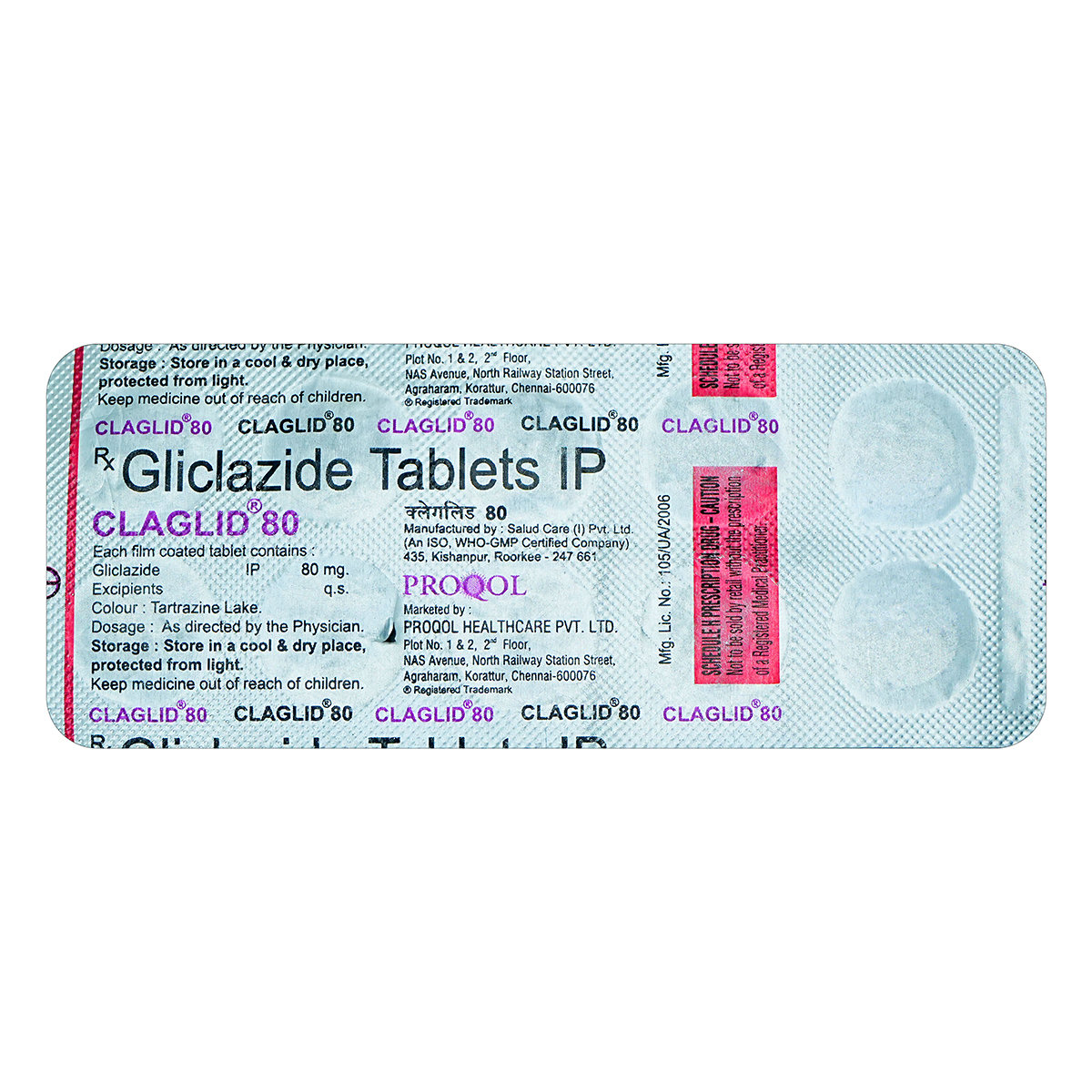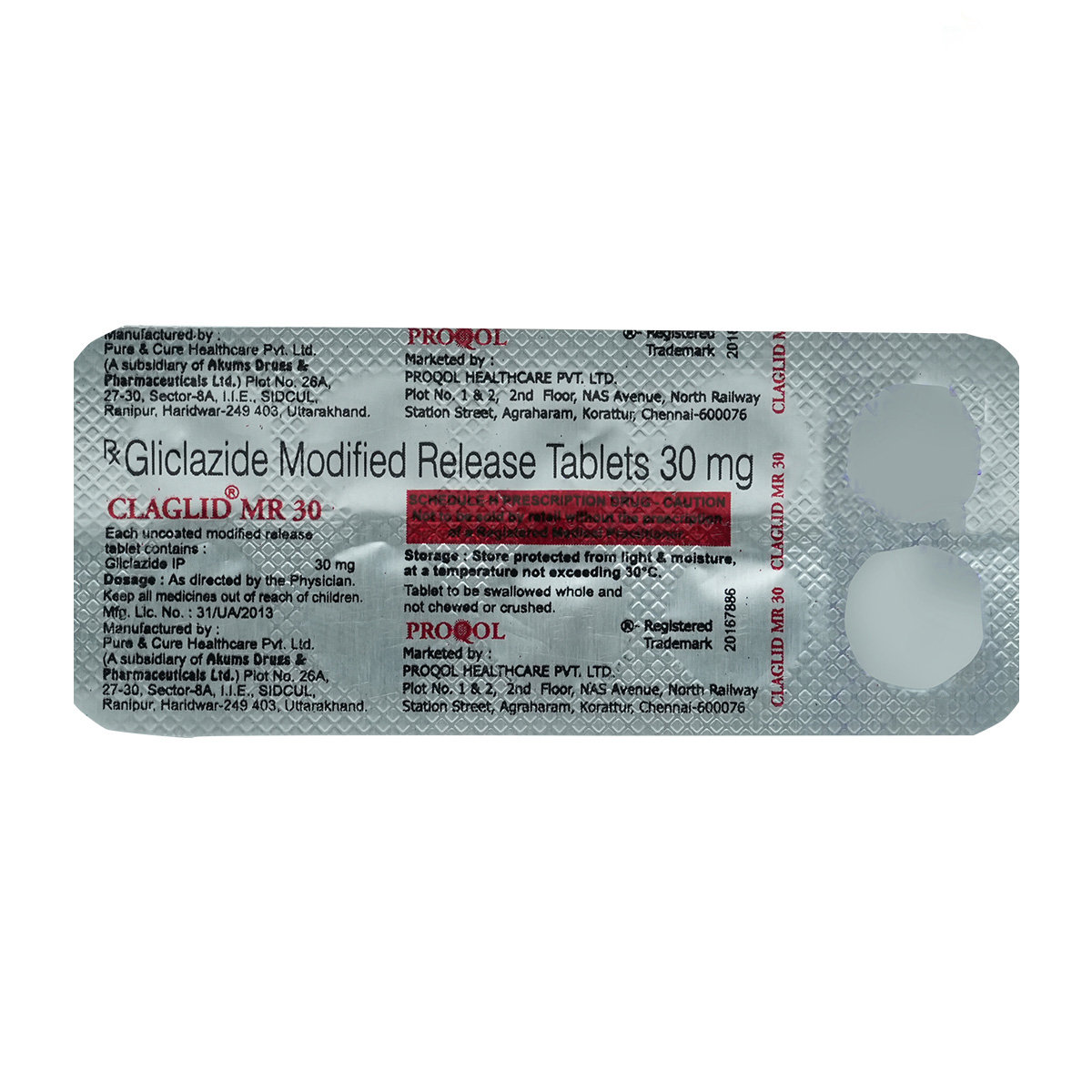Gliclazide
About Gliclazide
Gliclazide belongs to the class of drugs called ''oral hypoglycemic'' used to treat type 2 diabetes mellitus when diet and exercise alone cannot control their blood sugar levels. Type 2 diabetes is a chronic or lifelong disorder that affects the way our body processes glucose. People with type 2 diabetes either do not produce enough insulin, or the insulin produced cannot perform its function in the body (insulin resistance). Middle-aged or older individuals are most likely to suffer from type 2 diabetes, so it is also known as adult-onset diabetes.
Gliclazide contains gliclazide. It works by increasing the amount of insulin released by the pancreas. It stimulates insulin secretion from the pancreas and decreases blood sugar levels. Gliclazide prevents the blood glucose level from rising to very high levels, thus keeping your blood sugar level under control.
Gliclazide should be taken in the dose and duration your doctor advises. In some cases, you may experience certain common side effects, such as stomach ache or indigestion, feeling sick (nausea), vomiting (diarrhoea), and constipation. Most of these side effects do not require medical attention and resolve gradually over time. However, please consult your doctor if you experience these side effects persistently.
Do not stop taking Gliclazide on your own since it may cause a rise in your blood sugar levels leading to other health issues like blindness, kidney damage, and loss of limbs. Before starting Gliclazide, let your doctor know if you are pregnant or planning to get pregnant or breastfeeding. And also, tell the doctor if you have/had any medical history of heart, liver, and kidney diseases, glucose-6- phosphate dehydrogenase (G6PD) deficiency (abnormality of red blood cells), and haemolytic anaemia. Avoid alcohol consumption while taking Gliclazide; it might increase the side effects (hypoglycemia). Inform your doctor about all the medicine you are taking and your health condition to rule out any unpleasant side effects. Gliclazide works best when coupled with a healthy lifestyle like losing weight if you are overweight (BMI >25), eating fewer calories (low fat and sugary food), and being more physically active (at least 150 min of activity every week).
Uses of Gliclazide
Medicinal Benefits
Gliclazide plays a vital role in managing diabetes and achieving good control of blood sugar levels. Gliclazide is a class of medications called a sulfonylurea, which decreases raised blood sugar levels by stimulating insulin release from the beta cells located in the pancreas (insulin-secreting organ). In a nutshell, Gliclazide prevents the blood glucose level from rising to very high levels, thus keeping your blood sugar level under control. Gliclazide plays a vital role in controlling blood sugar levels and prevents serious complications of diabetes like retinopathy (eyesight loss), nephropathy (kidney problems), neuropathy (nerve damage), diabetic foot ulcer and delayed wound healing. Gliclazide shows optimum effects when taken along with healthy lifestyle changes like weight loss, a healthy diet, and regular exercise.
Directions for Use
Storage
Side Effects of Gliclazide
- Stomach ache or indigestion
- Feeling sick (nausea)
- Being sick (vomiting)
- Diarrhoea
- Constipation
- Hypoglycemia (low blood sugar levels)
Drug Warnings
Gliclazide should not be used in patients with type 1 diabetes or diabetic ketoacidosis. Do not take Gliclazide if you are allergic to Gliclazide or any ingredient of Gliclazide, have severe liver or kidney problems, have severe thyroid or adrenal gland problems, or have ever had a diabetic coma. Some diabetic patients taking Gliclazide may develop a rare but serious condition called lactic acidosis. In this condition, too much lactic acid is accumulated in the blood. So, your liver and kidney's proper functioning is required to eliminate excess lactic acid from the blood. Consult your doctor and take only if prescribed under medical supervision. Gliclazide shows optimum effects when taken along with healthy lifestyle changes like weight loss, regular exercise, healthy diet.
Drug Interactions
Drug-Drug Interactions: Gliclazide interact with other medicines used to treat high blood sugar (oral antidiabetics, GLP-1 receptor agonists or insulin), antibacterial drugs (sulfonamides, clarithromycin), medications to treat high blood pressure or heart failure (captopril, enalapril), medicines to treat fungal infections (miconazole, fluconazole), drugs to treat indigestion and ulcers in the stomach or duodenum (H2 receptor antagonists such as ranitidine), medicines to treat depression (monoamine oxidase inhibitors such as selegiline, phenelzine), painkillers or antirheumatics (ibuprofen, phenylbutazone), anti-inflammatory medications (glucocorticoids such as hydrocortisone, prednisolone), blood thinner /anticoagulant medication (warfarin), and medicines containing alcohol.
Drug-Food Interactions: Gliclazide interacts with alcoholic beverages, which may increase the risk of hypoglycemia (low blood sugar).
Drug-Disease Interactions: Gliclazide should be avoided in patients with severe liver or kidney problems, severe thyroid or adrenal gland problems, or whoever has a diabetic coma, as it may worsen the condition.
Drug-Drug Interactions Checker List:
Safety Advice

Alcohol
unsafeDo not consume alcohol while taking Gliclazide. Taking Gliclazide with alcohol can cause hypoglycemia. So, keep your doctor informed if you drink alcohol.

Pregnancy
cautionAs the data around the use of Gliclazide in pregnant women is limited, the use of Gliclazide in pregnancy is restricted. Please consult your doctor for advice before using Gliclazide.

Breast Feeding
cautionTell your doctor if you are breastfeeding. Do not breastfeed while you are taking Gliclazide without advice from your doctor. If you take Gliclazide while breastfeeding, there's a risk of your baby getting low blood sugar.

Driving
cautionGliclazide may cause hypoglycemia (low blood sugar levels), whose symptoms include unusual sleepiness, shivering, palpitations, and sweating. This may affect your ability to drive. Use caution while driving or doing anything that requires concentration or mental alertness.

Liver
cautionTell your doctor before receiving the Gliclazide if you have a history of liver diseases/conditions. Your doctor may adjust your dose depending upon your current kidney conditions.

Kidney
cautionTell your doctor before receiving the Gliclazide if you have a history of kidney diseases/conditions. Your doctor may adjust your dose depending upon your current kidney conditions.

Children
unsafeGliclazide is not recommended for children below the age of 18 years. The safety and effectiveness of Gliclazide have not been established in children. So, only take Gliclazide if the doctor has prescribed you.
Habit Forming
Diet & Lifestyle Advise
- Fill your half plate with starchy veggies, a quarter with proteins, and a quarter with whole grain.
- Eat at regular intervals. Do not take a long gap between meals or snacks.
- Monitor your blood sugar level regularly, especially when there are a lot of fluctuations.
- Lose weight gradually to achieve a healthy body mass index ( 18.5 to 24.9)
- Reduce saturated fat intake in food like chips, crisps, pastries, biscuits, and samosas. Choose omega-3 fatty acid-containing oils for daily cooking. For frying, you may use palm oil, groundnut oil, mustard oil, rice bran oil, and safflower oil.
- Do not take stress as it may elevate your blood sugar level. You may adopt stress management techniques like mindfulness, yoga, or meditation to control stress-related blood sugar changes.
- Keep your blood pressure as normal (120/80mmHg) as possible, as it reduces the risk of cardiovascular diseases in diabetes patients.
- Take the medication as directed by the doctor and at regular intervals if you take Gliclazide more than once per day. Do not use other over-the-counter medicines, herbal or vitamin supplements without informing your pharmacist or doctor when you take Gliclazide.
- Your doctor also guides you on noticing and managing the early symptoms of high/low blood sugar levels.
Patients Concern
Disease/Condition Glossary
Type 2 diabetes: It is a chronic (long-lasting) condition that keeps the body away from properly utilizing insulin. Hence, people affected with type 2 diabetes either do not produce enough insulin or are resistant to insulin. Middle-aged or older are most likely to suffer from type 2 diabetes, which is also known as adult-onset diabetes. Type 2 diabetes symptoms include frequent urination at night, increased thirst, slow wound healing, increased hunger, fatigue and blurred vision. There may be weight gain in some cases, while in rare cases, weight loss may be observed. The complication of type 2 diabetes also includes nerve problems, kidney problems and damaged retina of the eyes or blindness, loss of limbs, sexual dysfunction, and an increased chance of heart attack or stroke.
FAQs
Gliclazide helps to control the blood sugar level. It works by increasing the amount of insulin released by the pancreas. It stimulates insulin secretion from the pancreas and decreases blood sugar levels. Gliclazide prevents the blood glucose level from rising to very high levels, thus keeping your blood sugar level under control.
In type 1 diabetes, the body doesn’t produce insulin as the islet cells (insulin-producing cells) in the pancreas are destroyed. In type 2 diabetes, though islet cells are working, the body doesn’t respond to insulin as it becomes resistant to insulin.
Yes, Gliclazide can cause indigestion. Eat a proper well-balanced diet and drink plenty of fluid to avoid it.
Once blood sugar goes below the normal range (70mg/dl), it is called hypoglycemia or low blood sugar in people with diabetes. If you feel your blood sugar level is going down and feel weak, immediately eat sugar candies. It will help to balance the blood sugar level in your body. So, keeping sugar candies with you if you have diabetes is advisable.
Yes, Gliclazide can cause stomach upset if taken empty stomach. So, it should be preferably taken with a meal or just after a meal to avoid an upset stomach.
If you forget to take Gliclazide, do NOT take a double dose to make up for your forgotten dose. Taking overdose might cause your sugar level to fall down rapidly. Try to take the next dose at the usual time.
No. Gliclazide is only prescribed for the treatment of type 2 diabetes also called as 'non-insulin-dependent diabetes'.
There is no clinical evidence that Gliclazide affects fertility in either men or women. Speak to your doctor before taking Gliclazide.





